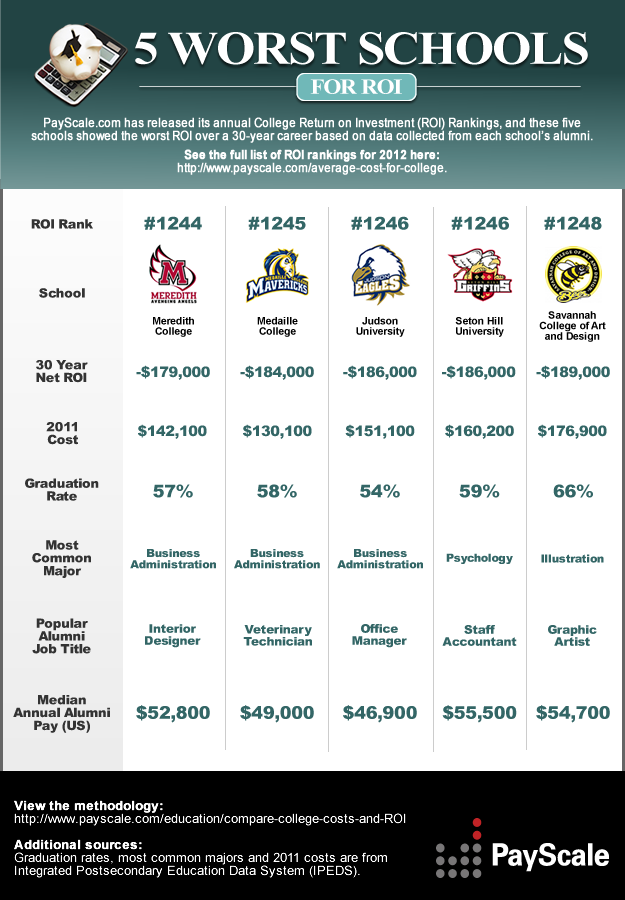"By making ITT a part of my portfolio I'm also investing in America's future."


Colleges for Profit Are Growing, With Federal Help
By FLOYD NORRIS
There are a lot of government subsidies, and in the current fiscal atmosphere many are shrinking by necessity. What appears to be lacking is any rational way of deciding which should shrink.
The volume of federally guaranteed student loans to students at so-called proprietary colleges — the ones that intend to operate at a profit and get nearly all their revenue from the government — continues to grow.
At the same time, state and local governments across the country are slashing spending on higher education, and community colleges — the ones most likely to offer alternatives to the students recruited by the far more expensive proprietary schools — are suffering some of the largest reductions.
That trend has been welcome news to the proprietary colleges. “The competitive landscape” is getting better, Kevin M. Modany, the chief executive of ITT Educational Services, one of the larger for-profit colleges, told analysts this year.
“When you look at what’s going on right now from a community college perspective,” he said, “we’re seeing a lot of state budgets being constrained. We’re seeing dollars being pulled from their budgets and they’re really capped in terms of their enrollment opportunities.”
ITT Educational, on the other hand, opened four new campuses in the first three months of this year, raising its total to 148 locations in 48 states. It expects to open at least four more later this year. It has 71,000 students enrolled.
In Washington, the Obama administration has been trying to write rules that would stop loans going to students at the most exploitative of the schools, ones whose students are most likely to default on the loans and least likely to get jobs if they graduate. The Department of Education is expected to announce within a few weeks which programs at which schools are failing, but that determination will have little immediate impact. The earliest that any school will lose financing is 2014.
ITT Educational Services, which runs ITT Technical Institute, used to be part of the international phone company known as ITT, but it was spun off years ago. It issues associate’s and bachelor’s degrees, and even some master’s degrees. Its shares trade on the New York Stock Exchange and it advertises heavily.
I got interested in ITT Tech after I watched one of its commercials, full of promise of bright career opportunities for students who sign up. At the end of the commercial, the following words flashed on the screen, in small type and for only a few seconds:
“Credits earned are unlikely to transfer.”
If you enroll in a public community college and get a two-year associate degree, you can almost certainly transfer to a four-year college and complete your bachelor’s degree in two more years. If you drop out, as many do, you can return to the same or another college years later and complete a degree. But it appears that ITT Tech students are stuck. ITT Tech will award degrees to students who complete enough classes, but any student who wants to transfer will probably have to start over.
How many students who enroll at ITT Tech go on to get a degree?
That sounds like a simple question, but it is not one that ITT Educational wants to answer.
The company does disclose a lot of numbers. But many of those numbers are not very useful. From the Web site, I learned that half the students who earn associate’s degrees in business administration do so within the normal period, while the other half take longer. For that two-year diploma, I learned that they pay an average of $48,000 in tuition and fees. Similar numbers are available for the myriad other programs ITT Tech offers. But there are no hints as to how many students actually get degrees, or how many drop out. The company would not provide any overall figures.
It did, however, point me to a government Web site that lets you check graduation rates campus by campus. Some of ITT Tech’s campuses had no information available, but the headquarters location in Indianapolis said that 16 percent of students who entered the school in 2004 earned degrees within three years of enrolling in associate degree programs or six years of enrolling in bachelor’s degree programs. In the fall of 2010, the Indianapolis campus had 7,619 undergraduate students. By the end of that school year, it had awarded 538 associate’s and 336 bachelor’s degrees. Last year, ITT Educational had revenue of $1.5 billion, of which 89 percent came directly from the government through grants and loans. Some of that money came from states, but a large majority came from Uncle Sam. Students and their parents put up about 4 percent, and 7 percent came from nongovernment loans.
Raising that 7 percent has been an issue. Last year, the company was able to arrange such nongovernment guaranteed loans by promising lenders it would repay the loans if the students did not. This year it could not renew that arrangement and is having to finance the loans itself. In effect, that means it gets less than full tuition from some students, with a promise they will pay the money later.
ITT Educational has impressive profit margins. In 2009 and 2010, pretax profits exceeded what it spent on educating students. Even in this year’s first quarter, when revenue and profits were off from a year earlier, pretax profit amounted to just under 30 percent of revenue.
The decline in earnings did not slow the flow of money to shareholders. During those three months, the company spent $135 million on education costs and paid nearly $147 million to buy back shares. Those education expenses were down 2 percent from a year earlier, while spending on share buybacks rose 5 percent. Marketing costs were up 6 percent.
All those profits would dry up and vanish were government support to wither away, but so far there is little sign of that. In the 2010-11 academic year, the government guaranteed nearly $24 billion in loans to students at proprietary schools and provided almost $9 billion more in grants. All that money went to the schools.
Critics of the schools say that many students, even those who graduate, are unable to earn enough to repay the loans. Students who attend such colleges are far more likely to default on their loans than are students who attend other types of schools.
It is far from clear whether the Obama administration’s effort to cut off loans to particularly unsuccessful schools will have much impact, or even if it will happen. A trade group of proprietary schools has filed suit to halt the rule, calling it an unjustified “regulatory excess.”
That group used to be called the Career College Association, but it changed its name to the Association of Private Sector Colleges and Universities and proudly proclaims that “the market” has determined the success of its members. If so, it is a market in which the government pays nearly all the bills but leaves students with debts many cannot pay.
Whatever the case used to be for subsidizing these highly profitable companies, it ought to be a lot less compelling now when the country is slashing subsidies for other types of schools — ones that generally do a better job for their students but that spend far less on lobbyists.
http://www.nytimes.com/2012/05/25/bu...1&ref=business






Comment